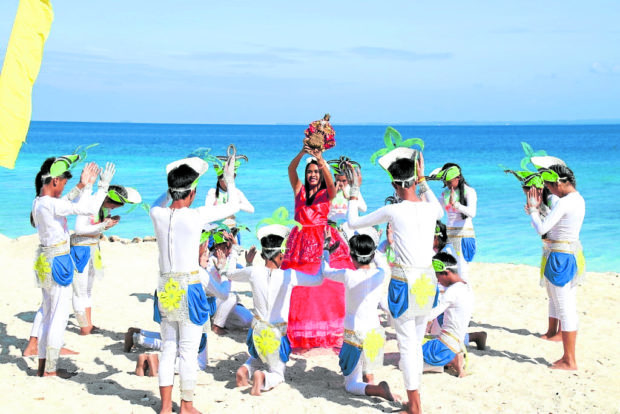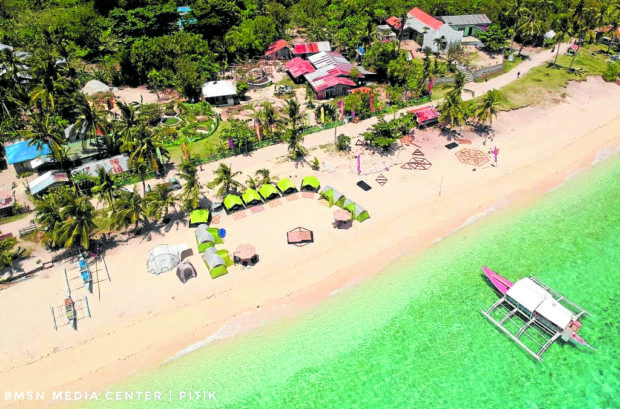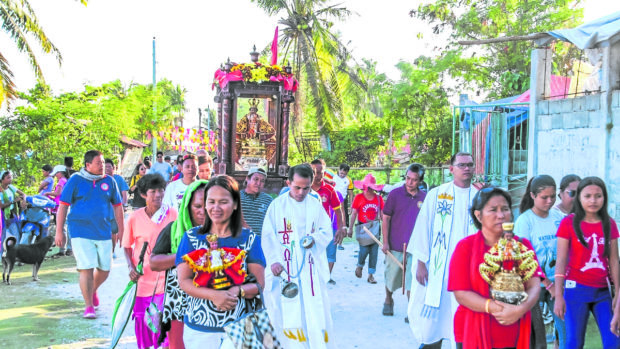Faith grows on Kinatarcan Island in Cebu

ISLANDERS’WELCOME Sinulog dancers welcome the image of the Sto. Niño de Cebu on its arrival on Kinatarcan Island in 2018. —PHOTOS COURTESY OF BASILICA MINORE DEL STO. NIÑO MEDIA CENTER
CEBU CITY, Cebu, Philippines — The people of Kinatarcan Island off the western coast of Cebu province felt something was missing even if they were living in paradise.
“We craved for something more, the one that physical food cannot suffice,” said Ma. Elvira Paglinawan Kessler, a resident of Cebu City who owns a house in Kinatarcan.
In 2008, Kessler sent word to the Augustinian fathers, officially known as the Order of St. Augustine (OSA), in Cebu to form a mission station on the island.
She offered her 4,700-square-meter property to be the site of a chapel where Catholics, like herself, can regularly attend Masses.
Her request was granted by the Archdiocese of Cebu and the Augustinian fathers, the first missionaries who arrived in the country, in the hope of serving the community and bringing people closer to God.
Catholics used to comprise only 15 percent of the island’s 9,000 population. The rest belong to other religious denominations who all live in harmony away from the bustling urban center that Cebu has become.
The mission sent to Kinatarcan proved successful. Since 2008, the number of Catholics on the island grew to 50 percent, said Fr. Aladdin Luzon, OSA, project coordinator of Sto. Nino Development Foundation and head of the Socio-Pastoral Apostolate of the Basilica Minore del Sto. Niño de Cebu.
The Catholic Bishops’ Conference of the Philippines (CBCP) has dedicated 2021 as the Year of “Missio ad Gentes,” Latin for “mission to the nations,” as the country celebrates the 500th anniversary of Christianity in the Philippines.

CATHOLIC MISSION The Catholic population of Kinatarcan in Sta. Fe, Cebu, has grown since Augustinian missionaries set foot on the island in 2008.
Sacraments
In a pastoral letter, Davao Archbishop Romulo Valles, CBCP president, recognized the efforts of missionaries in bringing God closer to His people, especially those who do not know Him.
“The Christian faith arrived and prospered in our land, through the dedication and heroic sacrifices of thousands of men and women missionaries from various parts of the world,” read the pastoral letter, “Becoming Jesus’ Missionary Disciples.”
Luzon said the Augustinian fathers continued evangelizing people on Kinatarcan even if they still could not hold daily Masses.
“Our mission in the area is to bring the sacraments of the Church to the island, such as holding Masses, baptism and wedding. Our need now is to have a resident priest there,” he said.
“In a way, we want to bring God closer to the people. We want to make God more visible to them through His ministers,” he added.
Sto. Niño’s arrival
Kinatarcan lies about 25 kilometers off the west coast of Cebu and 12 km northeast from Bantayan Island. It can be reached through a 45-minute boat ride from Daanbantayan town on the northern tip of Cebu.
The island, which is within Sta. Fe town, comprises three barangays: Hagdan, Kinatarkan and Langub.
In 2018, when the Augustinians celebrated a decade of successful mission and faith building, they brought the image of Sto. Niño to Kinatarcan.
Small motorized fishing boats welcomed the vessel carrying the image as Sinulog dancers waited at the port.
“I can see that people on the island are so hungry for God. Whenever they see priests on the island, they can’t contain their joy. When asked what they want to do, the islanders would say, ‘We want to have a Mass,’” Kessler said.
Before, when there was still no mission area in Kinatarcan, priests seldom went there.
“There were people who died and did not have any blessing. Now, the islanders are so happy because they can go to confession, hear Mass, and have counseling with the priests,” Kessler said.
“People are basically longing for God’s presence on the island.”

LEADING THE FLOCK Fr. Aladdin Luzon, OSA (center, holding an incense), and Fr. Genesis Labana, OSA (right), lead the procession of the Sto. Niño de Cebu on Kinatarcan Island in this
photo taken three years ago.
Beyond spiritual help
Aside from spiritual help, Luzon said the Augustinians were also helping the community through various programs with some nongovernmental organizations and private individuals.
He said priests and volunteers also trained islanders to be ready for disasters, and helped introduce some livelihood projects to people who earned money through fishing and backyard farming and gardening.
Living on the island, the priest said, is not easy since they are prone to disasters. Teaching people about how to prepare themselves for whatever eventualities helped.
Despite being battered by Supertyphoon “Yolanda” (international name: Haiyan) on Nov. 8, 2013, Kinatarcan survived without a single casualty due to the preemptive evacuation.
Now that the new coronavirus disease (COVID-19) pandemic has affected the islanders, Luzon urged the people to never lose hope and to cling to God.
“Let us keep hoping and pray to God,” he said.
Luzon assured the people of Kinatarcan of the Church’s continued journey with them.
“We are gifted to give. Whatever we (priests) received, we share with others. Before, the Augustinians built churches; now, we build communities and journey with people in their sufferings and happiness,” he said.
Disclaimer: The comments uploaded on this site do not necessarily represent or reflect the views of management and owner of Cebudailynews. We reserve the right to exclude comments that we deem to be inconsistent with our editorial standards.
